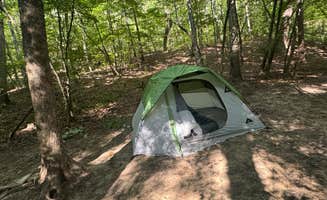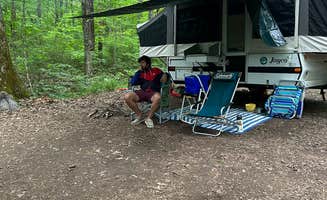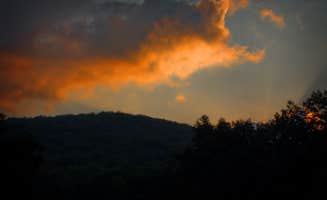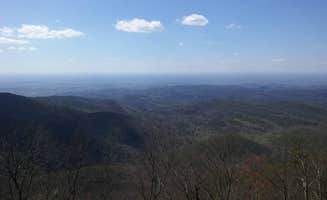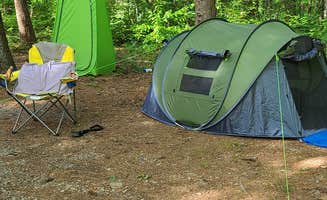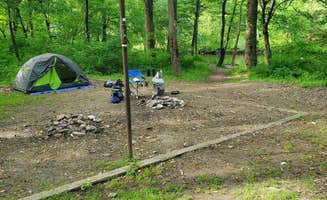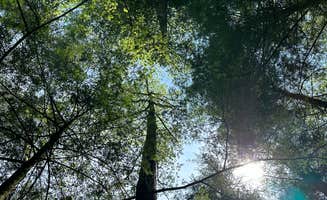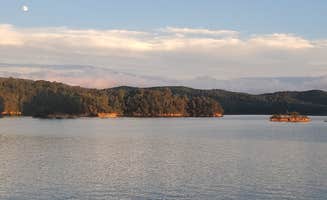Rustic camping near Calhoun, Georgia centers around several Wildlife Management Areas featuring primitive sites at elevations ranging from 800 to 4,000 feet. The mountainous terrain creates distinct temperature variations, with higher elevation sites experiencing temperatures 5-10 degrees cooler than lower elevations even in summer months. Road conditions deteriorate significantly after rainfall, with several access routes becoming hazardous without 4WD capability.
What to do
Fishing access: The Conasauga River provides excellent trout fishing opportunities at Conasauga River Camp, where the water remains clear even during warmer months. "Lovely little spot next to a very swimmable and warm crystal clear river - very popular with locals, and I imagine would be packed on weekends," notes camper Grayce F.
Mountain biking: Forest service roads throughout the region offer challenging cycling routes with significant elevation changes. "This is a popular mountain bike area and the cyclists can easily hit speeds of 30MPH on the sketchy downhills," reports Roy B. about conditions near the dispersed sites.
Swimming holes: Blue Hole Dispersed camping at Crockford-Pigeon Mountain WMA offers easy access to natural swimming areas. According to Ava R., "We stayed 3 days 2 nights here in our 21' pop up camper with our generator. Road is pretty well maintained, spots are good size, some only large enough for tent/car camping."
Hiking trails: Multiple trailheads start directly from camping areas, including the Emery Creek Trail and Tearbritches Trail. The Tearbritches Trail provides access to Bald Mountain summit (4,005 ft) and descends to the Conasauga River with a 3.4-mile one-way hike and significant elevation change.
What campers like
Stargazing conditions: The higher elevation sites offer exceptional night sky viewing with minimal light pollution. Ball Field Dispersed Camping Area receives particular praise for astronomical viewing. "I searched on terrain maps for some of the best south facing skies for a great view of the belt of the milky way. Go here on a new moon night in the summer and you're sure to have a great night of uninterrupted beauty," recommends Tyler J.
River camping: Several sites offer direct riverside camping with water access. The Tennessee Wall Camp provides "sites with fire pits scattered throughout a small clearing. Plenty of firewood to collect on site," according to Suzie K.
Solitude: Most camping areas accommodate multiple groups while maintaining adequate spacing. At SongBird Trail Camp in the Cohutta WMA, John B. notes, "This area will speak for itself once you arrive. It's very peaceful and calming, beautiful hikes, pretty nature, and great memories!"
Wildlife viewing: Many campers report wildlife sightings, particularly during morning and evening hours. Bears are common throughout the region. Campers should properly secure food, as rangers actively enforce proper storage regulations.
What you should know
Road conditions: Access roads vary significantly in quality, with many routes deteriorating after rainfall. "The road in can be handled by a sedan," Karen mentions about Murrays Lake Primitive, but notes that "there is a lake, but it's not all that pretty."
WMA regulations: Camping in Wildlife Management Areas requires specific permits. As Sarah H. notes about Blue Hole Dispersed, "Land pass required. No alcohol is permitted. This is a wildlife management area. The camp sites are first come, first serve."
Site availability: Weekends see significant increases in camping traffic. Grayce F. observes that Conasauga River Camp is "very popular with locals, and I imagine would be packed on weekends."
Ground conditions: Many sites have uneven terrain requiring preparation. "The field is fairly sloped, so you want to have some shoring if you are in a trailer, roof top tent, or van," advises Steve V.
Cell service: Connectivity varies dramatically by location but is generally minimal. Roy B. reports from Ball Field Dispersed Camping Area that "the cell connection is intermittent and usually only one bar (or no cell)."
Tips for camping with families
River access camping: Sites near water provide natural entertainment for children. Jack's River Falls Trail offers multiple family-friendly camping areas. "Great group campsite not far from Jack's River Falls. We had a group of 10 that spread out over this little 'island' very easily," reports Renee B.
Timing considerations: Spring camping offers wildflower viewing opportunities, while fall provides colorful foliage with fewer insects. Summer camping at higher elevations provides natural cooling.
Wildlife safety: The region has an active bear population requiring proper food storage and disposal. Multiple campers report bear sightings, especially near food sources.
Bathroom planning: Most sites lack facilities completely. Bringing portable toilet solutions is recommended for families with young children, as the nearest facilities may be several miles away.
Tips from RVers
Site access: For motorhomes and travel trailers, Mountain Side Overlook at Rich Mountain Wildlife Management Area offers suitable spots but requires careful navigation. "4x4 is not required, but ground clearance makes it non-accessible to some," notes The M.
Generator use: Most dispersed sites have no restrictions on generator use during reasonable hours. At Crockford-Pigeon Mountain WMA, Ava R. mentions, "We stayed 3 days 2 nights here in our 21' pop up camper with our generator."
Water access: No water sources are available at most sites. RVers should arrive with full water tanks, as the nearest fill stations may be 20+ miles away in developed areas.


